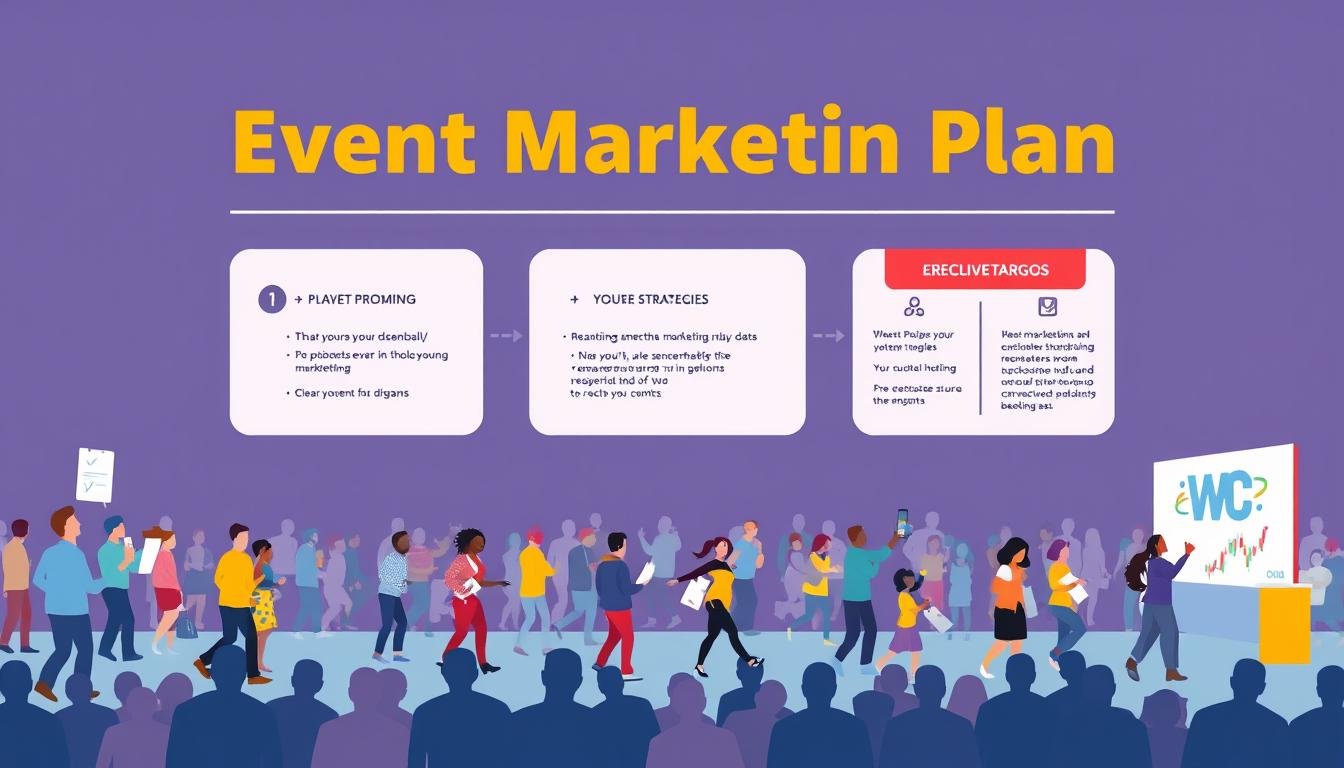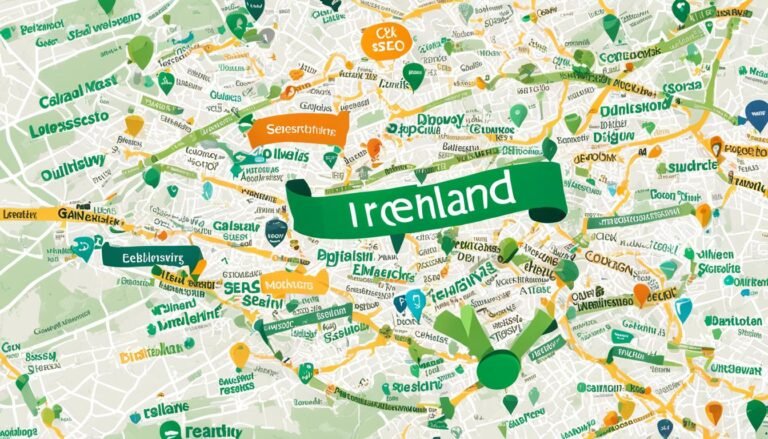The Ultimate Guide to Event Marketing
Did you know that 95% of marketers believe in-person events can really help their company reach its goals? This shows how powerful event marketing is today. It’s key for launching new products or building strong brand ties. We’ll share strategies and insights for a memorable event marketing campaign. This will help you not just engage, but also wow your audience.
This guide gives businesses the event marketing tips they need. It helps brands create experiences that stick with attendees. We’ll cover the types of events, planning, and promotion. Learn how effective event marketing boosts brand awareness and customer loyalty.
Key Takeaways
- Event marketing has a proven impact on achieving key business objectives.
- In-person events foster connections in a digital-first world.
- Brand awareness is the primary goal for many event marketers.
- Virtual, hybrid, and physical events offer unique benefits for diverse audiences.
- Collecting customer feedback through events can enhance product offerings.
Understanding Event Marketing
Today, many industries use event marketing to reach their audience. It involves planning and running events to promote a brand, product, or service. These events can be in-person, online, or a mix of both. They help increase visibility and build strong connections with potential customers.
Definition of Event Marketing
Event marketing means making and managing events for marketing goals. It helps create personal connections that online ads can’t match. With 14% of marketing budgets going to events, it’s a big part of marketing.
Experiential marketing is the top tactic for industry pros. It shows how important events are in today’s marketing plans.
Importance of Event Marketing for Businesses
Businesses now see how big of a deal event marketing is. Research shows that 95% of marketers think in-person events help a lot with business goals. They improve customer engagement and make the brand more known.
Conferences and trade shows offer great networking chances, learning sessions, and places for business growth. Over 80% of U.S. marketers see good sales results from event marketing. So, companies see events as key for making their brand visible and well-liked.
Types of Event Marketing
Knowing the different types of event marketing is key to making your events successful. Each type has its own goals and benefits. They all play a part in making your brand stand out.
Conferences and Trade Shows
Conferences and trade shows are great for showing off products and services to a focused group. They draw in professionals and fans of the industry. This means lots of chances to network and make connections.
Brands can use these events to get new leads, increase visibility, and show they’re leaders in their field. Meeting people face-to-face makes a big impact. It helps build strong bonds with customers and partners.
Seminars and Workshops
Seminars and workshops are all about sharing knowledge and improving skills. They’re smaller, so there’s more time for deep talks and personal chats. This lets brands connect better with customers and draw in new people.
These events share valuable information that really speaks to the audience. This helps with branding and makes a lasting impression.
Pop-Up Shops and Launch Parties
Pop-up shops and launch parties are all about getting people excited right away. They offer a hands-on way to sell products and create a buzz. These events get customers talking about the brand.
They’re also a chance to get feedback from attendees. This helps improve marketing plans. Pop-up shops and launch parties are fresh ways to connect with people through event marketing.
Event Marketing Benefits
Event marketing offers many advantages that boost a company’s market presence. It helps build relationships, increase visibility, and drive revenue. These benefits show how events can lead to success for businesses.
Generating Business and Revenue
Events are a direct way to make business and revenue. They allow brands to meet potential customers face-to-face. Over 95% of marketers believe in-person events help achieve business goals.
This belief leads to real results, like immediate sales and conversions.
Enhancing Customer Engagement
Events create memorable experiences that engage customers. They help brands build strong relationships with their audience. This leads to loyalty.
Event marketing lets companies tailor their messages to their audience. This ensures a strong connection that grabs attention.
Building Brand Awareness
Events are key to building brand awareness. They link brands with real experiences, making a lasting impact on attendees. About 64% of event marketers aim to boost brand awareness.
This increase in visibility can make brands more recognized and familiar in the market.
| Event Marketing Benefits | Impact |
|---|---|
| Generating Business and Revenue | Increased sales through face-to-face interactions |
| Enhancing Customer Engagement | Stronger relationships and brand loyalty |
| Building Brand Awareness | Higher visibility and lasting impressions |
The Ultimate Guide to Event Marketing Planning
Planning your event marketing is key to a successful event. It means setting clear goals and managing your budget well. A good event planning guide shows what makes events successful.
Setting SMART Goals for Your Event
Using SMART goals—Specific, Measurable, Attainable, Relevant, and Timely—helps guide your event plans. Clear goals keep you focused and let you track success. For example, aiming to draw 200 attendees means watching how many sign up.
Setting goals helps every decision support your event’s big picture.
Budgeting for Successful Events
Starting with a budget is crucial to avoid surprise costs. A solid budget outlines where money goes, making sure it’s used well. Experts suggest spending about 7 percent of your event budget on marketing.
But for events like fundraisers, that number can jump to 50 percent. A thorough budget helps you plan for events that meet your goals.
Effective Event Promotion Strategies
Successful event promotion uses many strategies to grab the attention of the audience and build excitement. By using social media, email, and working with others, event planners can make their event more visible and get more people to come.
Utilizing Social Media for Event Marketing
Social media is a great way to make events popular. Posting regularly and keeping it interesting helps reach more people. Brands should use platforms like Facebook, Instagram, and Twitter to share news, countdowns, and sneak peeks.
Getting people to share their own stories makes the event feel more like a community. This helps spread the word even more.
Email Marketing Campaigns for Event Promotion
Email marketing is still key for promoting events. Having a big list of people who might come helps send out targeted messages. Sending emails with special deals or tips about the event can really get people excited and buy tickets.
Using data to make emails better can also help make sure more people come.
Influencer Collaborations and Partnerships
Working with influencers can really change how you promote an event. They already know lots of people who might be interested in the event. This can help make the event more visible and sell more tickets.
It’s important to pick influencers who really care about the event’s theme. This makes their support feel real and helps draw in more people.
| Promotion Strategy | Benefits | Best Practices |
|---|---|---|
| Social Media | Increased reach and engagement | Regular, interactive posts; hashtags; contests |
| Email Marketing | Direct communication, personalized content | Segmented lists; compelling subject lines; clear CTAs |
| Influencer Collaborations | Enhanced trust and visibility | Aligned values; authentic messaging; co-created content |
Using these strategies, brands can really connect with people who might come and make their marketing stronger.
Measuring Success: Event Marketing KPIs
It’s key to know how to measure event success. This helps improve future plans and make sure goals match with the company’s aims. Event marketing KPIs help by looking at data from different places. This lets businesses see what works and make smart choices.
Tracking Registrations and Check-Ins
Event planners can see how well they promoted by comparing check-ins to registrations. For events in person, seeing who shows up is a big clue about success. About 67% of people usually come, showing how well the event was promoted.
For online events, losing 30-50% of attendees is common. This means it’s important to keep an eye on who stays engaged. Making sure people keep interested is key.
Social media helps track interest too. By seeing how often events are talked about online, planners can tell what people think and care about.
Revenue Analysis and Visitor Engagement
Looking at revenue is important, but so is understanding the return on investment (ROI). This means looking at leads and relationships made. For in-person events, making money is a big deal, with 56% of organizers focusing on it.
Getting feedback from attendees helps improve future events. It’s like getting a report card on how well things went. Offering discounts for future events can get more people to share their thoughts.
Using data from different places helps make better decisions. This way, businesses can see what works and what doesn’t.
| KPI Type | Metric | Importance |
|---|---|---|
| Attendance | 67% for in-person events | Key measure of participant interest |
| Revenue | 56% of organizers rate importance | Vital for assessing profitability |
| Engagement | 54% report attendee engagement | Critical for future event planning |
| Social Media Mentions | Real-time tracking available | Gauge discussion and excitement levels |
| Sponsorship Satisfaction | Metrics like clicks and leads | Determines sponsor value in events |
Conclusion
In today’s fast-paced marketing world, event marketing is key. It’s shown that 95% of marketers see live events as a chance to connect with people face-to-face. This shows how powerful it is to meet your audience directly through great event marketing plans.
Events do more than just boost brand awareness. They help build strong relationships that can turn into loyal customers. This makes them a crucial part of a strong marketing plan.
Many marketers, 31% to be exact, think events are the best way to reach people. And it works! After events, 84% of attendees like the brand more. So, making events engaging and focused on what the audience wants is a must.
Setting clear goals, tracking how well you’re doing, and improving based on feedback is key. This makes your events better and more effective.
The main point is that events help you grow by building connections. By using different types of events and focusing on what your audience likes, you can grow and make valuable connections. As more top executives plan to spend more on live events, it’s clear that staying on top of this trend is important.
So, take the chance to create events that people will remember. Doing this will help your brand do well.
Source Links
- The Ultimate Guide to Event Marketing
- Event Marketing – The Ultimate Guide
- The Ultimate Guide to Event Marketing in 2024
- Event Marketing: The 2024 Guide
- The complete guide to event marketing | DigitalOcean
- The Ultimate Guide to Event Marketing – Tips & Tricks
- Types of Event Marketing & Event Marketing Strategies
- The Ultimate Event Marketing Guide 2024 I Sweap
- The Complete Guide to Event Marketing – Impact XM
- The Benefits of Event Marketing {2024 Guide}
- Event Marketing: The Definitive Guide for 2024
- The Ultimate Guide to Event Marketing for Successful Brand Events
- How to Market Your Event: The Ultimate Guide to Event Marketing
- What is Event Marketing? Strategies & Examples
- The Ultimate Event Marketing Guide: Strategy, Timelines & Templates
- The Ultimate Guide to Successful Event Promotion: 17 Must-Follow Steps
- Event marketing KPIs: Measure event success with these top 11 KPIs
- How to Measure Event Success: A Comprehensive Guide to ROI
- The Complete Guide to Event Marketing 2024 – Stova
- Guide to event marketing: Everything you need to know | Storykit
- Decoding Success: The Ultimate Guide to Mastering the 5 P’s of Event Marketing








